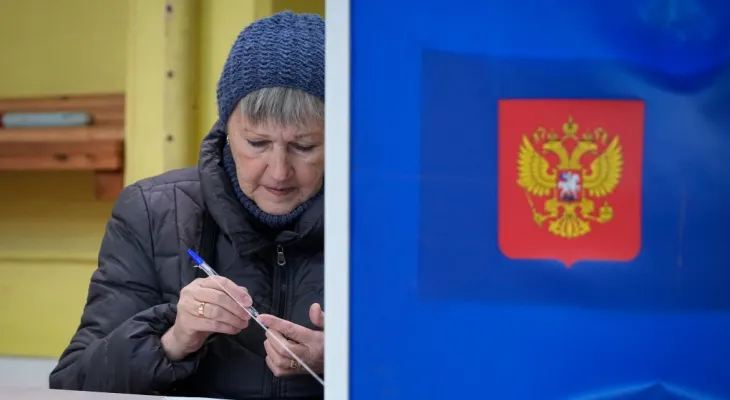Search here
Newspaper
Search here

Arab Canada News
News

Published: March 16, 2024
Voters across Russia cast their ballots today, Saturday, on the second day of the elections scheduled to formalize six more years of power for President Vladimir Putin, who faces no serious challengers after crushing political opposition during his nearly quarter-century rule.
The elections come against the backdrop of a fierce crackdown that has stifled independent media and prominent human rights groups, and Putin's staunchest opponent, Alexei Navalny, died in a prison in the Arctic in February, with other critics either jailed or exiled.
The 71-year-old Putin faces three token challengers from Kremlin-friendly parties who have refrained from criticizing him or his comprehensive invasion of Ukraine. Putin has portrayed his war in Ukraine, now in its third year, as an existential battle against the United States and other Western powers determined to destroy Russia.
Officials said voting was proceeding in an organized manner. But despite tight controls, at least six sabotage incidents were reported at polling stations on Friday and Saturday, including incendiary bombings and several people pouring green liquid into ballot boxes. The latter was a clear tribute to Navalny, who was attacked in 2017 by an assailant who sprayed green disinfectant on his face.
A 50-year-old university professor was arrested on Saturday after unsuccessfully attempting to pour green liquid into a ballot box in the city of Yekaterinburg in the Ural Mountains. She was jailed for 15 days on a charge of "petty hooliganism," but may face further charges, according to local news site Ura.ru. The official Russian news agency TASS reported that a retiree in the Altai region of southern Siberia was also arrested after attempting to damage ballots.
In Podolsk, a town near Moscow, police arrested a woman on Saturday after she spoiled her ballot by writing an unspecified message, according to OVD-Info, a police monitoring group that provides legal assistance. She was charged with "defaming the Russian army" and fined 30,000 rubles ($342).
Russian lawmakers have proposed a new law to punish election saboteurs with penalties of up to eight years in prison.
Meanwhile, a video released by the Russian election monitoring group Golos appeared on social media showing staff at a polling station in the southern city of Krasnodar stuffing several ballots into ballot boxes.
Also on Saturday, Ukrainian missile and drone attacks hit the country’s interior again. TASS said an armed group also tried to infiltrate the Russian border area from Ukraine.
The regional governor Vyacheslav Gladkov said via the Telegram app that two people were killed in the Ukrainian shelling of the border city of Belgorod, Russia, and ordered malls and schools closed due to the security situation. Meanwhile, local officials denied reports of explosions at polling stations in the border city, TASS said.
Dozens of people have been killed in Belgorod since the war began.
Elsewhere, a Ukrainian drone attack caused a fire at an oil refinery operated by the Russian oil company Rosneft in the Samara region, 1065 kilometers (660 miles) southeast of Moscow, the regional governor said.
The Russian-appointed governor of Kakhovka, Vladimir Saldo, said one person was killed and four others injured in the city of Kakhovka in the illegally annexed Kherson region of Ukraine, blaming a Ukrainian drone attack that he said aimed to disrupt the elections.
Earlier, TASS reported that a Ukrainian drone also dropped explosives on a polling station in the illegally annexed Zaporizhzhia region of Ukraine.
In the lead-up to the vote, Putin boasted of successes on the battlefield in Ukraine, where Russian forces recently made additional gains relying on their firepower superiority.
On Friday, Putin described Ukrainian shelling and incursions across the border this week as an attempt by Ukraine to intimidate Russians and disrupt the vote. He vowed that the attacks "will not go unpunished."
Despite the attacks, analysts say the Kremlin needs a high turnout in the elections to signal Russians’ approval of the war and legitimize Putin for another term.
The Russian Defense Ministry has been a main engine of growth, working around the clock to produce missiles, tanks, and ammunition, shielding Russians from the economic impact of the war, leading to lower unemployment and higher wages. The Russian wartime economy has also shown resilience, expanding despite harsh Western sanctions.
The Russian opposition movement dissatisfied with Putin or the war urged voters to come to the polls on Sunday afternoon, the last day of voting, as a form of protest. Navalny endorsed this strategy shortly before his death.
Voting is taking place at polling stations across Russia’s 11 time zones, in the illegally annexed territories of Ukraine, and online.
Western leaders have mocked the vote, calling it a parody of democracy.
European Council President Charles Michel sarcastically congratulated Putin on Friday on his "landslide victory" in an election still technically ongoing, writing on social media platform X, "No opposition. No freedom. No choice."
Aside from the lack of options for voters, independent monitoring possibilities are extremely limited. There were no major international observers. Only Kremlin-approved registered candidates—or state-backed advisory bodies—can appoint monitors at polling stations, reducing the chances of independent oversight bodies.
Comments